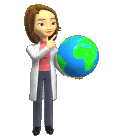 Results of a recent poll by ICM, a public opinion research firm from England, two thirds of the British public and nearly nine out of 10 (88%) of 18-24 year olds are unable to name a single famous female scientist, despite scientists being viewed as a good role model. The Royal Society , the national academy of science, requested the poll of public attitudes regarding women in science.
Results of a recent poll by ICM, a public opinion research firm from England, two thirds of the British public and nearly nine out of 10 (88%) of 18-24 year olds are unable to name a single famous female scientist, despite scientists being viewed as a good role model. The Royal Society , the national academy of science, requested the poll of public attitudes regarding women in science.
Just 12% of 18-24-year-olds polled were able to name a female scientist such as Marie Curie while nearly half (47%) were able to name a male scientist such as Albert Einstein. However, while women are currently less well-known for science, public attitudes to women becoming scientists appear to be relatively progressive. Overall scientists were seen as good role models for girls, proving far more popular than celebrity chefs and popstars.
From a choice of six role model types for a daughter, 47% of respondents chose ‘life-saving doctor’ while ‘Nobel prize-winning scientist’ came second with 20% of first mentions. ‘Olympic gold medallist’ was third (14%) and ‘best-selling novelist’ fourth (9%) with only 5% of respondents choosing a celebrity chef or chart-topping pop star as a suitable role models for young girls.
When asked what career they would like their daughter (real or imagined) to pursue, scientist was the first choice for 18% of respondents compared to 27% for lawyer, 26% for teacher, 17% for nurse, 4% for chef and 2% for builder.
Knowledge of the role played by women in major scientific breakthroughs was also low. Just 6% of those polled by the Royal Society knew that a female scientist (Jocelyn Bell Burnell) played a major part in the discovery of pulsar stars, and only 18% were aware that another woman - Dorothy Hodgkin - discovered the structure of insulin. Ninety-six% of respondents thought men and women were equally well-suited to a career as a scientist.

Comments